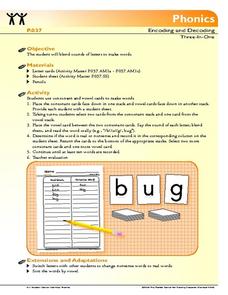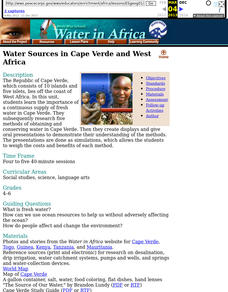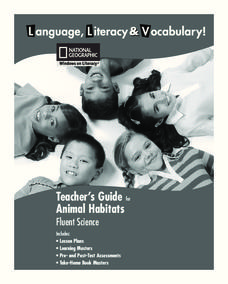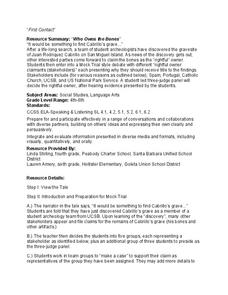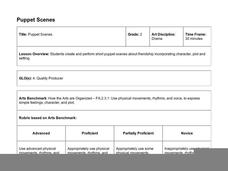Curated OER
Writing and Presenting a Fable Using Research
Elementary and middle schoolers research animal facts and use them in a fable. First, they pair-share to find animal traits to use in writing a fable. They then complete a prewriting worksheet. After going through the writing process,...
Read4Health
Piggybook: A Read4Health Lesson Plan
"You are pigs." With those three simple words, the lives of the Piggott family were changed forever. Read aloud the children's story Piggybook by Anthony Browne and teach your class the importance of personal responsibility, learning...
Reed Novel Studies
The Wind In The Willows: Novel Study
True friends stick together. In the case of The Wind In The Willows, the friends just happen to be a toad, mole, rat, and badger who team up to beat the weasels. The resource covers the first chapter of their raucous adventures. Scholars...
Reed Novel Studies
What Katy Did: Novel Study
What doesn't break you
makes you stronger. Katy, in What Katy Did, learns this lesson the
hard way. After a terrible accident and a long recovery, Katy becomes what she always wanted to be—good and kind. Scholars learn
about Katy's...
Curated OER
Civil War Literature Circle
Historical fiction can be a valuable asset when learning about the past. Integrate several novels written about the Civil War into your social studies unit, with groups of four working collaboratively to comprehend the novel from...
Florida Center for Reading Research
Phonics: Encoding and Decoding, Three-In-One
Scholars use the provided pack of alphabet cards to construct basic CVC words, then write down each word they make in one of two columns. Column one is for real words and column two is for nonsense words.
Curated OER
Joyful Noise: Poems for Two Voices by Paul Fleischman
Do your young readers know that poems can be performed as a team? They listen to a few examples from Paul Fleischman's book Joyful Noise: Poems for Two Voices, paying attention to how the how readers work together. They examine the...
Curated OER
The Art of Persuasion-Analysis of Argument
Analyze advertising techniques in order to pinpoint persuasive strategies that writers use. These same techniques are then examined in persuasive speeches. You will have to find your own advertisements, but speeches are included. Finish...
Curated OER
Plot the Oysters' Peril!
Use comic strips to teach sequencing in narrative poetry. As homework, each class member selects a comic strip with 4-8 frames, cuts the frames apart, places the pieces in an envelope, and brings the envelope to class. Class members swap...
Curated OER
Where Has It Been? Tracking the Ivory-Billed Woodpecker
By studying the assumed extinction, and subsequent rediscovery of the Ivory-billed Woodpecker, learners use maps and come up with a scenario for the rediscovery of the bird. This incredibly thorough lesson plan is chock-full of...
Curated OER
Water Sources in Cape Verde and West Africa
Young explorers study the scarcity and importance of a continuous supply of fresh water in Cape Verde. They research the five main ways that fresh water is obtained in these countries. Each research group prepares a presentation, and...
English Enhanced Scope and Sequence
Identifying Synonyms
"Let the hunt begin!" As an introduction to synonyms, second graders generate a list of word pairs that have similar meanings. The words pairs are written on sentence strips, cut apart, shuffled, and distributed to class members who must...
National Geographic
Animal Habitats
Explore animal habitats and reinforce speaking, listening, reading comprehension, and writing skills with a unit that focuses on the Arctic, desert, ocean, prairie, and rainforest. Enthusiastic scientists read informational text to...
Consortium for Ocean Science Exploration and Engagement (COSEE)
Understanding the Food Web
Building on prior knowledge of the pervious lesson plan in the series, pupils explain the previous lesson plan to each other. Then they write a simple guide for a young child to read on the same topic.
EngageNY
Building Background Knowledge: Learning About the Historical and Geographical Setting of Esperanza Rising (Chapter 1: “Aguascalientes, Mexico, 1924”)
Set up your class to read Esperanza Rising, by Pam Muñoz Ryan, through a class read-aloud and exploration of the setting. The detailed instructional activity outlines each step. First, class members read over the first few pages and...
Florida Center for Reading Research
Phoneme Split and Say
Little ones are provided with all the tools needed to begin segmenting phonemes. There are twenty Elkonin box picture cards, five blank Elkonin box cards, and full instructions on how to help pre-readers practice splitting and saying...
Macmillan Education
Teamwork
Learners develop self-awareness and discuss the importance of cooperation and communication through worksheets and hands-on, collaborative activities.
Museum of Tolerance
Cultural Research Activity
Class members explore cultural diversity through a variety of texts that showcase the importance of traditions. Then, they interview their family members to research their own cultural background and write their findings on quilt pieces....
Channel Islands Film
Arlington Springs Man: Lesson Plan 1
Learning to craft quality questions is a skill that can be taught. Class members use the Question Formulation Technique to learn how to create and refine both closed-ended and open-ended questions. They then view West of the West's...
Curated OER
Lesson Four: Comparatives and Superlatives
Put on your best smile, or a least a better one, for this lesson on superlatives and comparatives. English language learners first fill out a graphic organizer by finding other people in the class who are taller than they are, shorter...
Middle Tennessee State University
John Brown: Hero or Villain?
"Love it or leave it." "You're either for us or against us." Rhetoric and it's polarizing effects are the focus of a lesson that uses John Brown's attack on Harper's Ferry as an exemplar. Groups examine primary source documents,...
Channel Islands Film
Who Owns the Bones
A study of the history of the Channel Islands, located off the coast of southern California, continues as class members conduct a mock trial to determine which group of stakeholders should have the right to claim the remains of Juan...
Discovery Education
One Flew over the Cuckoo's Nest
After reading Ken Kesey's One Flew Over The Cuckoo's Nest, class members view the 1975 film version and then craft a critical review in which they compare the two versions and evaluate the success or failure of Milos Foreman's...
Hawaiʻi State Department of Education
Puppet Scenes
Explore character, plot, and setting through dramatic puppet play. Second graders discuss basic story elements and then practice making a character with their sock puppets. After they've crafted a dynamic puppet, they pair up to create a...






